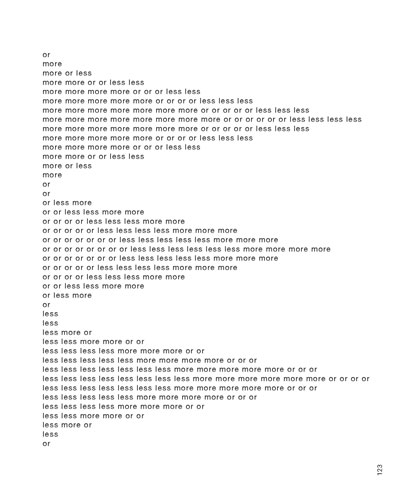Notes on the Poem
We've devoted this and the previous six Poem of the Week installments to the poetry collections on the 2018 Griffin Poetry Prize shortlist. We now draw to the end of the tour with "or more or" (as it's called in the "Contents" at the end of the book) from Donato Mancini's Same Diff. This selection can easily lay claim to being an intriguing example of two very different - perhaps even mutually exclusive - forms. As you can tell from the image of the poem here, before you enlarge it to fully take in the words, it is a form of concrete poetry. The poem's themes, significance amd effect are achieved visually, through the arrangement and styles of letters, words and lines on the page. At first glance, the three arrows? icicles? daggers? ... or any numbers of pointed objects or signposts might not yet signify what the poem is about, but those shapes leave an impression that informs our continued exploration of the poem. And of course, that impression, that impact, that layer of experience of the poem is lost on us if we cannot see the page. That's where it's revelatory to discover that the poem also stands on its own as a startlingly powerful example of sound poetry. Imagine it being read aloud or ... go ahead, read it aloud! The driving force of the incessant repetitions and variations of a seemingly simple figure of speech is hypnotic. Intriguingly, the phrase's meanings - somewhat, with small variations - echo the process by which the phrase is being deconstructed, with incremental variations that build such that the words' innocuousness suddenly becomes desperate, obsessive, sinister or ... or ... or ... are rendered blank, ready to take on new meanings. As the Griffin Poetry Prize judges concluded about Mancini's work throughout Same Diff, "[h]e is a custodian of language who returns it to us cleaned.” However you approach this particular poem, he has clearly done that here.
or more or
Donato Mancini
copyright ©2017 by Donato Mancini


You honestly think that’s a “starlingly powerful” poem? I couldn’t be more less less less impressed with it.